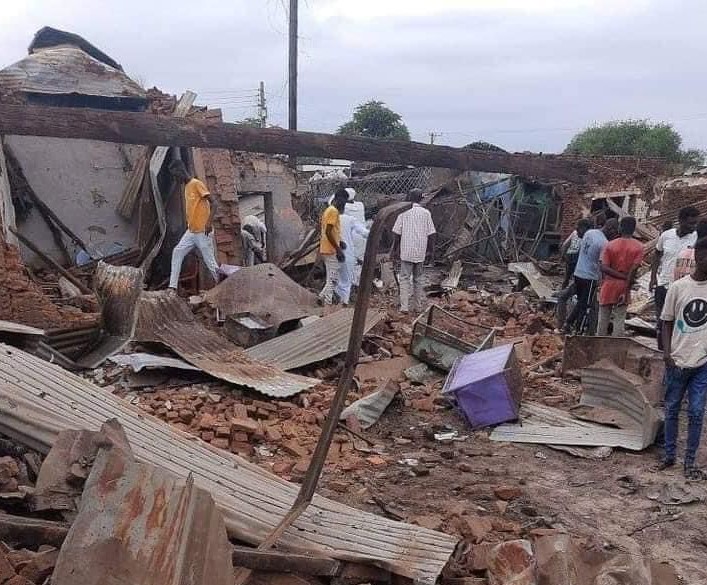Sudan junta bars UN delegation from Darfur

War devastation in Nyala, capital of South Darfur (Photo: RD)
Report by Abdelmonim Madibbo
The Sudanese government in Port Sudan prevented a United Nations delegation, headed by the Deputy Humanitarian Coordinator for Sudan, from visiting South and East Darfur last week, and asked them to leave Sudanese territory. A South Darfur official denounced the decision, suggesting that “evidence in the area condemns the army, so they decided not to allow the [UN] delegation to reach Nyala.”
South Darfur Minister of Social Affairs Hafiz El Saleh who was arranging to receive the UN delegation in Nyala, the capital of South Darfur, confirmed that the delegation was compelled to return across the border to Chad, without being able to visit the city.
The minister is member of the South Darfur civilian administration, set up by the RSF after they took control of the state.
UN Deputy Humanitarian Coordinator for Sudan Toby Harward declined to comment to Radio Dabanga at this time: “I would like to answer your questions, but the situation is very sensitive with the federal government in Port Sudan at the moment, I hope the situation will be resolved soon,” Harward said when approached for comment.
Minister El Saleh told Radio Dabanga that the UN delegation informed him last week that it was going to visit South Darfur and from there to East Darfur after visiting West and Central Darfur.
He added, “We prepared to receive the delegation in the South Darfur capital of Nyala, however, as the delegation prepared to leave the Central Darfur capital of Zalingei en route to Nyala, they received notice from the government in Port Sudan asking them not to visit South and East Darfur. The delegation contacted us and informed us that the Port Sudan authorities denied permission to complete the visit and returned halfway.”
The Minister of Social Affairs pointed out that the civil administration denounced the move and formed a delegation to visit the UN delegation in Zalingei instead, but were surprised again by a call from the delegation informing them that the authorities requested they leave Sudanese territory.
He confirmed that the delegation then left Sudan for Chadian territory, adding that his civil administration is now determined to reach the UN delegation in Chad to deliver a protest memorandum for South Darfur over the authorities in Port Sudan’s refusal to allow the delegation to visit the state.
The memorandum, which Radio Dabanga has seen, includes a number of paragraphs that the minister said would cause the government in Port Sudan to not allow the delegation to visit Nyala. It indicated that South Darfur faces a large gap in humanitarian services because it has been relying on services centred in the capital, Khartoum, for health supplies in particular (serums, medicines, seeds, pesticides, livestock vaccinations, books, etc.).
The memorandum states that the city of Nyala contains mines and unexploded ordnance among civilians in the areas that witnessed battles, and that they need urgent treatment by the relevant organisations.
El Saleh ruled out that the Sudan Armed Forces (SAF) would allow the UN visit, as “the SAF fear that the international community will see evidence of the crimes it committed in Nyala, especially with regard to the mines it planted and the unexploded ordnance in several locations in the city”.
He pointed out that these mines and ammunition have killed a number of people living in the area around the army command, seized by RSF in October last year, and in the southern market area located around the command.
“Until now, there are mines that have not been removed. If the delegation reaches the state, we will give them this evidence, which also includes the infrastructure and citizens’ homes that were destroyed by the air force and the mass graves of the victims around the command who were liquidated in the army’s detention centres.
“All this is evidence that condemns the army, so they decided not to allow the delegation to reach Nyala.”
He explained that the World Health Organisation and Save the Children, which work in the field of health and education, were part of the delegation and it was planned that they would conduct a survey to determine the extent of the need for aid in these two areas. In addition, the delegation was to assess the level of aid provided by international organisations in the state, and if it was found that there was an area that needed help, a number of other organisations would be directed to reach the state.
“The Port Sudan government, by refusing the visit of the UN delegation, seeks to deprive the citizens of South Darfur of any humanitarian aid and services that the UN and international humanitarian organisations can provide.”











 and then
and then